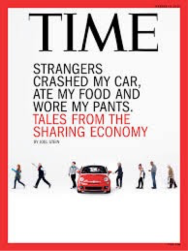The impact of the sharing economy continues to dominate business headlines and tourism/meetings industry conference conversations. The one constant element in both channels is that for the most part users are delighted with sharing economy options while legacy economy stakeholders are struggling to evolve their roles.
Let’s be clear: the sharing economy is not going anywhere. While it’s easy to say it’s just another example of how technology is changing our lives, the real driver of the sharing economy is a grass-roots shift in consumer trust from established corporate enterprises to self-forming peer networks. It’s as much of a social evolution as it is a technology one.
The good news is that after the initial shock and awe of disruption by the likes of VRBO, airbnb and Uber, forward-thinking brands are replacing fear and contempt with partnerships that are truly WIN-WIN. Check out these three examples – all of which have happened in the last 90 days alone:
I recently had the privilege of speaking at the Elite Meeting Alliance in San Antonio where the topic of the sharing economy came-up in multiple conversations with meeting professional attendees. It was apparent that while the vast majority of attendees had used shared economy platforms in their personal lives, fewer than 10% (based on a show of hands in a room of meeting professionals) had ever used them professionally. They did feel however that it was inevitable for meetings (both airbnb and Uber already have specific business travel arms) but that elements such as risk management, service consistency and room-block contracting needed to be dealt with.
I see opportunity knocking for DMOs. Right here. Right now.
The big knock trotted out by some is that “shared economy participants don’t understand our business or our attendees”. I’m sure its true. But what if they did? What if local airbnb hosts were formally trained by the local DMO on meeting planner/attendee service expectations and had access to briefings/advisories on group business opportunities that they could participate in and earn more revenue?
By navigating the shared economy maze to the intersection of the visitor experience and host/supplier DMOs can play a powerful leadership role in bringing the sharing economy into the existing tourism and meetings industry ecosystem. The result could very likely be:
- Improved visitor experiences that elevate the destination brand and increase local sharing economy revenues.
- Commitment to pay local taxes and comply with regulations (e.g. insurance and safety).
- Greater community engagement with the local tourism and meeting/convention industry.
Some might say this is heresy. Some might say it’s the natural order of competition. Others see it as a way to create new value from a social evolution.
And some smart DMOs are probably already creating plans to make it happen.


